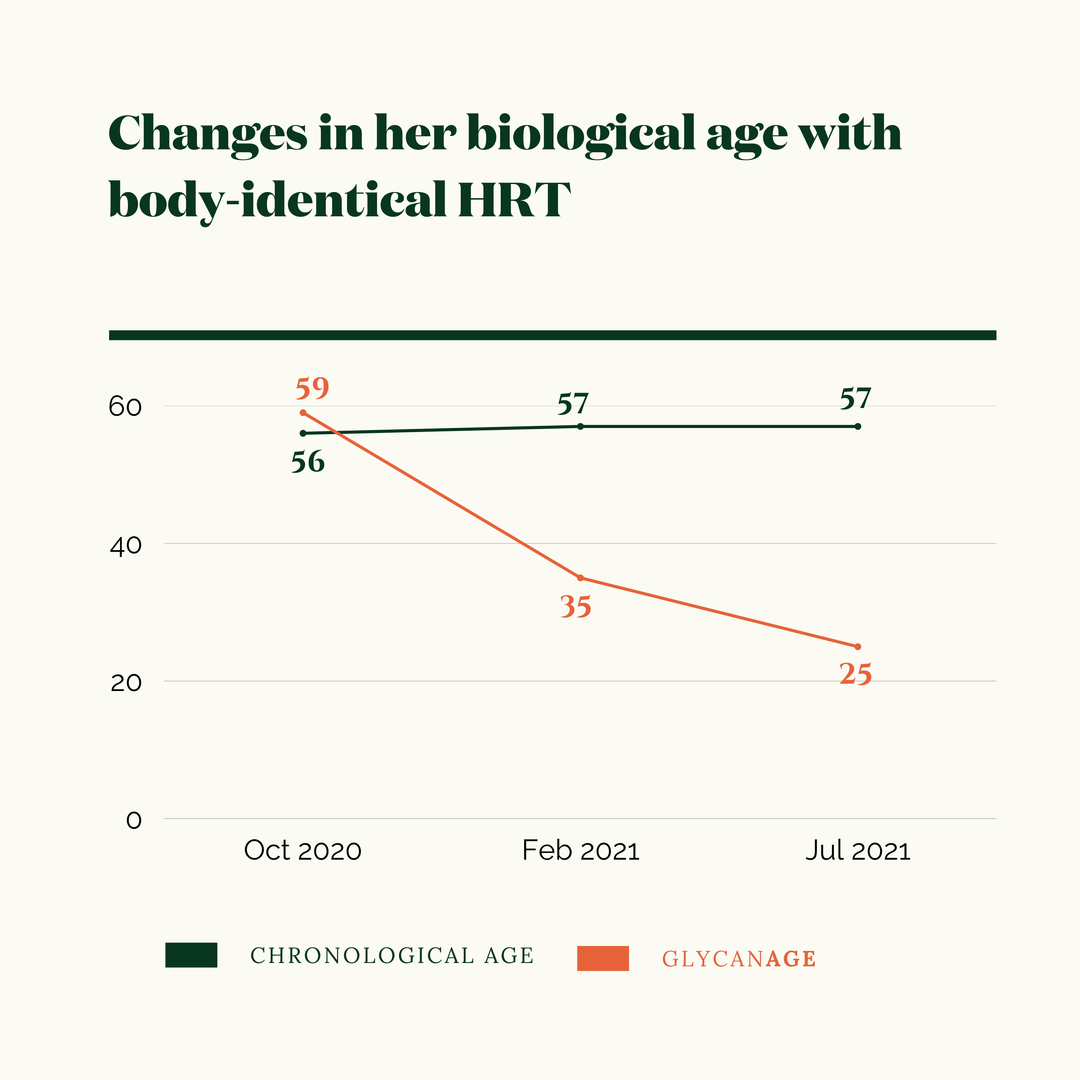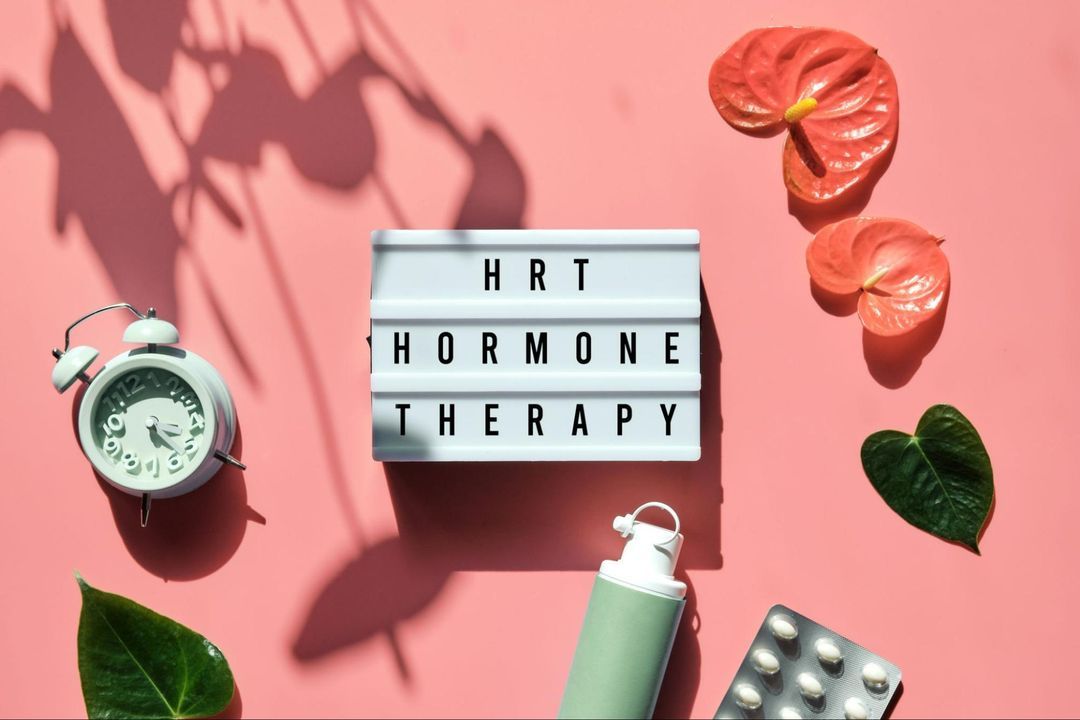What Are the 34 Symptoms of Perimenopause?
Discover the 34 symptoms of perimenopause and how they can affect your daily life. Stay informed and take proactive steps towards better health!

By The GlycanAge Team
Navigating women's health can be complex, especially when it comes to diagnosing perimenopause and menopause. Despite modern medical advancements, most women in the UK need six to seven years to receive an accurate diagnosis. Along the way, many are mistakenly diagnosed with other conditions like fibromyalgia, migraines, depression or irritable bowel syndrome (IBS).
This long and often frustrating journey can affect not only their health but also their work, with 20% of women leaving their jobs due to severe symptoms. Seeing how around 50% of the population goes through menopause, you would think that the situation would not be so dire.
However, the reality is still pretty gloomy. Interestingly, a woman can easily find out if she's pregnant using a home pregnancy test, so why is diagnosing menopause, a natural phase of life, so difficult?
 The Menopause Conundrum
The Menopause ConundrumDiagnosing menopause relies on testing hormone levels, an approach that can be challenging. Firstly, these tests need to be conducted at a specific time during the menstrual cycle, a condition that becomes increasingly difficult to meet as women enter perimenopause and their cycles become irregular.
Additionally, hormone levels can fluctuate significantly throughout the day, further compromising the reliability of such tools.
GlycanAge, a test that analyses biomarkers of biological age, may hold the key to this diagnostic puzzle. Research indicates that women's biological age (the age of the body’s cells and organs) tends to increase dramatically during menopause [1]. Glycans, the biomolecules at the core of the GlycanAge test, can change before any menopause symptoms appear, making them powerful predictive tools and offering a unique opportunity for early detection and intervention.
With the ability to predict menopause before severe symptoms like fatigue, night sweats, brain fog and joint pain occur, GlycanAge empowers women to take timely action. For instance, starting hormone replacement therapy (HRT) promptly can help women avoid developing severe symptoms, and in turn significantly improve their quality of life during menopause.
As women transition towards menopause, their bodies undergo significant hormonal changes, most notably a decrease in oestrogen levels. This transformation doesn't operate in isolation; it impacts a broad range of physiological processes. One such process is the glycosylation of immunoglobulin G (IgG), an antibody that plays a crucial role in our immune response. Glycans that are found on this antibody are the focus of the GlycanAge test.
Research has shown that during menopause, there's a shift in IgG glycosylation patterns. Specifically, there's an increase in the amount of galactosylated (G0) glycans attached to IgG [2]. This change is notable because an increase in G0 glycans is associated with inflammation and ageing.
The shift towards a higher proportion of G0 glycans during menopause mirrors the increase in biological age observed in menopausal women. This consistent observation strengthens the link between menopause and GlycanAge, suggesting that the test could serve as a valuable tool for menopause detection and monitoring.
Let’s see how our test helped menopausal women get a hold of their life.
Menopause symptoms aren’t a one-size-fits-all. While most people would associate menopause with hot flashes and night sweats, in reality, menopause symptoms can be so diverse, making it hard for women to truly understand their situation.
Taking everything we previously mentioned
It’s important to talk about the positive outcomes GlycanAge provided for our courageous clients that openly shared their stories.
 When our client that prefers to stay anonymous tested her GlycanAge for the first time, she was really shocked. She lead the same life as her husband - both were really fit and followed a healthy diet.
When our client that prefers to stay anonymous tested her GlycanAge for the first time, she was really shocked. She lead the same life as her husband - both were really fit and followed a healthy diet.
However, her husband’s result came at 20 years biologically younger, while she was 3 years older. How could this happen?
This alerted GlycanAge specialists to refer the client to the Newson clinic, our partners that specialise in menopause care.
They promptly diagnosed her and explained the positive impact of HRT. Since she was diagnosed on time, she successfully avoided any harsh symptoms.
In a short amount of time, her hair stopped falling out, she had more energy and overall she felt better.
Every subsequent GlycanAge test showed a significant improvement in her biological age.
Sometimes it takes a bit longer to get diagnosed with menopause, and even once you get the right diagnosis, it can take years to get on the right course of treatments. That’s what happened to our client who we’ll refer to as Susan.
It took her 7-8 years before she received the right diagnosis and found the treatment. At first, she was diagnosed with chronic fatigue syndrome as a result of having shingles 3 times. She was really tired all the time and had difficulty focusing as well as with her memory.
All that lead to an MRI scan by a neurosurgeon because one of the potential diagnoses’ was Alzheimer's. She also had a lot of muscle aches similar to fibromyalgia. She would experience up to 50 hot flashes a day, heart palpitations and more.
Needless to say, all of these symptoms made it impossible for her to do her job. After all of those years, Susan found out about a study we conducted with the Newson clinic. It involved testing women’s GlycanAge before going on HRT, as well as 3 months and 6 months in.

The doctors figured out that a low dose of testosterone was behind symptoms like chronic fatigue. Within the first week of taking oestrogen and progesterone, she felt great. Over time night sweats were gone, joint pain started to ease and she had a lot more energy.
Even her GlycanAge results went significantly down within a few months, showing the power of our test.
Hormone replacement therapy (HRT) is a widely used strategy to manage menopausal symptoms, aiming to replenish the body's dwindling hormone levels. The way HRT and GlycanAge work together creates a strong case for their use in managing biological ageing and menopause.
 HRT typically provides the body with a combination of oestrogen and progesterone to help regulate its functions and alleviate symptoms of menopause, such as hot flashes, night sweats and mood swings. However, the effects of HRT are not merely symptomatic; they have a profound influence on biological ageing, as reflected in the GlycanAge test.
HRT typically provides the body with a combination of oestrogen and progesterone to help regulate its functions and alleviate symptoms of menopause, such as hot flashes, night sweats and mood swings. However, the effects of HRT are not merely symptomatic; they have a profound influence on biological ageing, as reflected in the GlycanAge test.
With that said, it's important to recognise that HRT isn't a one-size-fits-all solution. Its suitability varies from person to person, depending on their health history, current symptoms, and personal preferences. HRT, depending on the type and formulation, may also carry certain risks, such as increased chances of blood clots, stroke and certain types of cancer [3].
This is where the GlycanAge test really shows its worth. By providing an objective measure of biological age, it can offer valuable insights into an individual's health status. For women nearing or going through menopause, these insights can help guide decisions about HRT.
For instance, if a woman's biological age is significantly higher than her chronological age, it might suggest a need for interventions like HRT. On the other hand, if it is the same or lower, she might decide to explore other ways to manage her symptoms.
If you’re looking for a way to prepare your body for menopause, we strongly suggest testing your biological age. The GlycanAge test is more than just a diagnostic measure; it also offers a reflection of our daily habits and behaviour and their impact on our health. Since these factors can influence our biological age, it is important to lead a healthy lifestyle.
 Diet
DietThe food we consume is fundamental to our health. A balanced diet, rich in fruits, vegetables, whole grains, lean protein and healthy fats, can ensure our bodies get a range of essential nutrients, which can help keep our cells – and their glycans – functioning optimally.
Regular physical activity is another critical component of a healthy lifestyle. Exercise can have numerous benefits, from boosting our cardiovascular health to improving our mood, all of which can potentially help to reduce our biological age.
Since building muscle mass becomes increasingly difficult during menopause, we suggest incorporating strength training into your routine. It’s important to build muscles around your joints for better protection.
Chronic stress can have a significant impact on our health. It's important to note that stress is not just about the challenges we face but also about how we respond to them. Techniques for managing stress include meditation, yoga, deep-breathing exercises or even spending time in nature.
 Sleep
SleepWhen we sleep, our bodies go into repair mode, performing various functions like cell regeneration, hormonal regulation and memory consolidation. It's also a time when our bodies regulate inflammation and manage stress.
By adopting these healthy lifestyle changes, women can help navigate menopause more comfortably and potentially influence their biological age in a positive way.
Menopause is a time of significant hormonal changes, which can accelerate biological ageing and lead to a variety of symptoms. For women navigating this challenging period, GlycanAge can help them understand these changes on a deeper level and the impact of their lifestyle choices.

By taking the GlycanAge test, women can monitor their biological age before, during and after menopause, empowering them with the knowledge to take control of their health, whether it's adjusting their diet, starting HRT or making other lifestyle changes.
Taking the test is a straightforward process. You'll collect a small sample of your blood using a finger-prick device and send it back to the GlycanAge lab for analysis. After three to five weeks, you'll receive a detailed report that reveals your biological age, provides insights into how your lifestyle factors might be influencing this number, and offers personalised recommendations for improving your health and potentially slowing down the ageing process.
The package includes a complimentary one-on-one consultation with a qualified scientist who will assist you in interpreting your results and devising a strategic plan to enhance your overall wellness and healthy ageing journey. With various price points and payment plans available, there is an option to suit each woman.
Don't let menopause dictate your health. Understand your body, make informed decisions and embrace this new phase of life with confidence. Join the club of well-informed women who are proactive about their health – buy a GlycanAge test today.

By The GlycanAge Team

Start or continue your GlycanAge journey
Don’t be afraid to reach out to us and ask questions, provide commentary or suggest topics.
Other articles you may like:
Discover the 34 symptoms of perimenopause and how they can affect your daily life. Stay informed and take proactive steps towards better health!
 By The GlycanAge Team
By The GlycanAge TeamMany women mistakenly think that menopause is something that only starts in their 50s when it can. In fact, it can happen at any time and for many different reasons. Most women's menopause age will be between 45 and 55, but it can sometimes take place earlier.
 By The GlycanAge Team
By The GlycanAge Team